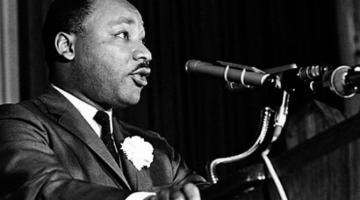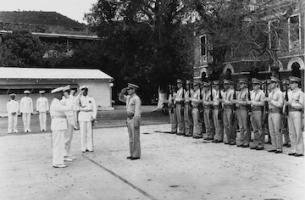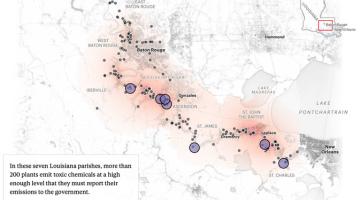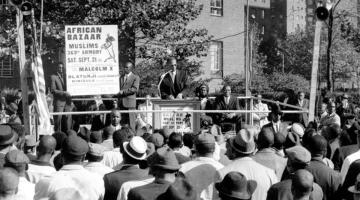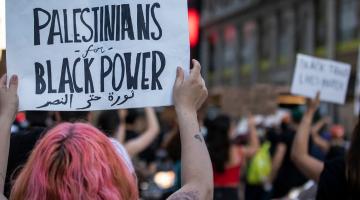The fight against fascism is a fight against racism and capitalism. The raid on a Chicago apartment building proves that the system’s violence at home and its wars abroad share the same logic and the same enemies.
The militarized raid by Immigration and Customs Enforcement (ICE), the Bureau of Alcohol, Tobacco and Firearms (ATF), and the FBI on a 130-unit building in Chicago’s South Shore, propelled by a $27 million Wells Fargo foreclosure, is not an isolated crisis but a direct act of economic warfare against the African/Black community. Federal agents broke into and ransacked apartments, detained adults and children, and arrested 37 people. This event exemplifies the systemic violence of financialization, wherein corporate banks weaponize debt and displacement to enact extraction, thereby reinforcing the structural disposability of Black life under conditions of internal colonialism. It further demonstrates that fascistic violence and accelerating militarism are capitalism's prescribed solutions to its own crises. Consequently, any "fight against fascism" not rooted in dismantling capitalism and imperialism cannot be considered a fight in the interest of the Black working class.
To dismiss this reality with the assertion that immigration enforcement "is not our fight" represents a profound failure to comprehend the interlocking dynamics of the war being waged against the colonized working class within the U.S. This warfare does not recognize narrow silos; the same system that forecloses on Black homes in Chicago deploys predatory lending against the Latino working class, attacks organized labor, and privatizes public goods for all. It is not a coincidence that the South Shore neighborhood is also where the U.S. Department of War recently broke ground on a ‘quantum facility’, a project that will displace residents, pollute the environment, appropriate water resources, and further entrench militarization. These are not disconnected battles but unified fronts in a coordinated campaign to destabilize the entire working class for corporate profit.
This logic of coercion is not confined to domestic policy; it finds a direct parallel in international relations. What we are witnessing in Chicago is not an isolated incident, but another manifestation of a coordinated, desperate, and violent campaign. It is the logical outcome of a system in decay, whose primary exports are militarism and misery. When we are encouraged to examine these incidents in isolation, we disarm ourselves from organizing against an imperial strategy that relies on a fusion of diplomatic mechanisms, military power, and economic coercion, a strategy often framed in the legitimizing language of “peace and stability.”
As evidenced in the brutal two- year genocide in Gaza in spite of a phony “peace”plan, Zionism acts as the sharpened instrument of capitalist imperialism, transforming a land and its people into a laboratory for displacement and resource extraction. This same imperial impulse, a direct continuation of the Monroe Doctrine’s claim to hemispheric hegemony, justifies the relentless economic, political, and military attacks on Venezuela for its defiance, while simultaneously manifesting in the ongoing neo-colonial imposition in Haiti upheld by votes for “gang suppression forces” by the United Nations Security Council (UNSC), where foreign boots on the ground and financial control masquerade as benevolent intervention of their own paramilitary gangs. Ultimately, it is the architecture of U.S. military commands like AFRICOM that reveals the full, terrifying synthesis: here, the ideological project of Zionism, the economic engines of capitalist imperialism, the speculative violence of financialization, and the enduring structures of (neo)colonialism collide and are coordinated. As such, “peace” enforced by the empire is merely the silence that follows subjugation.
The desperation of the U.S. bourgeoisie, a ruling class that is economically brittle, losing its global hegemony, and terrified of a multipolar world is being expressed through the relentless and calculated disintegration of any people or nation, from the South Side to Gaza, from Caracas to Port-au-Prince, that dares to exist outside its prescribed boundaries. Their desperation fuels a militarism that is both a primary tool for profit and a last resort for control. From the war machine to the prison-industrial complex, it is the same system, the same logic, the same enemy. They need war abroad to secure resources and strategic dominance, and they need repression at home to quell dissent and discipline a restless population. It is one, integrated struggle.
We cannot fight these battles in isolation. We must build a movement that sees the whole board. This is why our central organizational objective in this period is political education to connect these conjunctures. The precise, systemic nature of the attack makes the building of community self-defense coalitions an imperative for collective liberation. Such coalitions must transcend isolated struggles by uniting to protect housing, resist displacement, and directly counter the coercive forces of capital. In defending the most targeted and oppressed among us, we mount a unified defense for all, forging the power necessary to reclaim our human right to shelter, dignity, and a future free from imperialist extraction.
You cannot understand the UNSC vote on Haiti without understanding the militarization of Africa. You cannot understand the phony peace in Palestine without understanding the U.S. bases that dot the globe, projecting power and threatening sovereignty. We must continue to connect the struggle for Palestinian human rights to the struggle against police terror in Chicago, and to link the fight for Haitian self-determination to the fight against the blockade of Venezuela. This analysis exposes the machinery, names the enemy, and arms us with the understanding necessary to build a truly internationalist resistance.
Erica Caines is a writer and organizer in Baltimore and the DMV. Caines is the Field Operations and Membership coordinator of The Black Alliance For Peace, a member of the Black working-class centered Ujima People’s Progress Party in Maryland, and founder of #LiberationThroughReading, providing African children with books that represent them.



